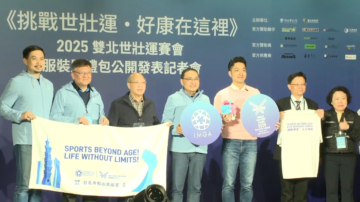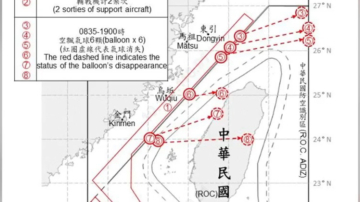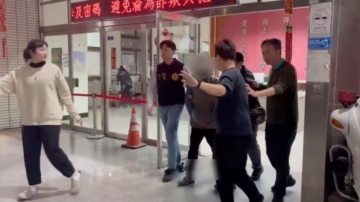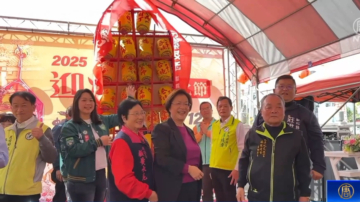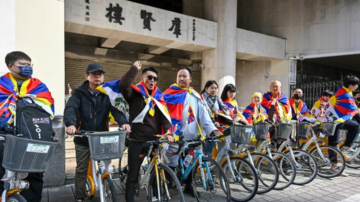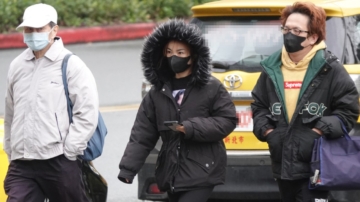【新唐人2011年2月10日讯】中华民国总统马英九在中央新春茶会上致词时指出,坚持九二共识,为维护主权,未来政府机关文书用语提到对岸时,一律改称大陆或对岸,不称中国,以免产生两个中国的主权混淆情况。
马英九总统在中央新春茶会上,认为现行的政府文书里,经常出现中国两字,这违反宪法中“中华民国是唯一中国”的精神,也不符合两岸“一个中国、各自表述”对等尊严沟通与谈判的基础。马英九总统还强调,根据宪法的精神,台湾对大陆的立场是:不承认其主权、不否认其治权。两岸政策及合作交流,都应该建立在这个法律基础上。
不过,在最近有关两岸关系的研讨会上,有专家指出,两岸关系进一步发展的障碍,在于政治制度的巨大差异。北京独立知识份子、宪政专家张博树对《美国之音》表示:“就两岸之间的整体关系来看,政治和经济两个方面,的确有一个问题。两岸政治关系远不如经济关系密切,因为两岸社会制度不一样。表面看是统独问题,实际是各自都有独立的政治实体,同时各自执行的又是不同的社会制度。”
两岸未来关系如何进一步发展,张博树认为:“恐怕前提就是大陆这方面的政治体制要加速改革。不在改变中国大陆现有政治结构上做出实质性的动作,很难想像台湾老百姓、知识份子,不管是谁当政,恐怕都不好接受中国现在大陆这方面的政治制度。”
美国的台海事务专家任雪丽(Shelley Rigger)则认为,美国、大陆、台湾三方在胡锦涛访美期间,都强调彼此关系的积极面,不过随着台海军力失衡情况日渐严重,三者之间的矛盾只会更加严重。
任雪丽指出:台海军力日渐失衡,大陆对台军事部署有增无减,但各自长期目标并没有改变。也就是:美国将继续依据“台湾关系法”维持对台安全承诺,出售武器给台湾;而大陆依然坚持对台拥有主权;台湾人民则希望维持独立现状,无意与大陆统一。任雪丽认为,尽管现阶段避开冲突符合台北、北京和华盛顿三方的利益,不过台海军力日渐失衡的事实,让存在于三者之间的矛盾难以完全消除。
关于美国对台湾的立场,美国助理国务卿坎贝尔(Kurt Campbell)强调:“在胡锦涛来访前,克林顿国务卿重申:对三个公报和“台湾关系法”的承诺。欧巴马总统也在胡锦涛访问期间的公开声明中,强调美国在“台湾关系法”之下的特别义务。”, 坎贝尔说:“我们非常了解我们的责任。”
新唐人记者宋风、周平综合报导。
Trends in US-China-Taiwan Relations
Taiwanese president Ma said at a New Year Party
Taiwan should keep the one-China consensus.
Official document should use Mainland or cross-strait,
instead of China. That way, there will be
no confusion that there are two Chinas.
Taiwanese President Ma Ying-jeou stated
at a central government’s New Year Party,
use of the word “China” in official documents
violates the constitution that
“Republic of China is the only China.”
It also contradicts with the consensus with Beijing
on “One China with respective interpretations.”
Ma stressed that Taiwan does not recognize
mainland’s sovereignty, but does not deny its rule.
Cross-strait relations should abide by this position.
Experts believe the obstacle to cross-strait relations
is the difference in political systems.
Constitutional scholar Zhang Boshu said to VOA:
There are issues in economic and political aspects
of cross-strait relationship.
Political tie is not as close as economic tie.
On the surface it is about unity or independence, but
the real reason lies in the different political entity
and different political systems.
To further cross-strait relationship,
Zhang believes mainland needs to speed up
political reform. Without fundamental changes,
it is hard to imagine Taiwanese people
will accept mainland’s current political system.
According Shelley Rigger, a US expert on Taiwan,
during Hu Jintao’s US visit, US and China focused
on positive aspects of Sino-US relationship.
But as Taiwanese military looses its balance,
conflicts will deepen in the tri-party relations.
Shelley Rigger said,
Taiwanese military is losing its balance
as mainland military installment increases.
The US will continue to sell weapons to Taiwan
according to Taiwan Relations Act.
China will continue to insist on sovereignty
while Taiwanese people hope for independence.
Avoiding conflicts is the interests of all parties,
but with the military imbalance,
conflicts cannot be resolved.
Kurt Campbell , US Assistant Secretary of State,
said before Hu’s visit, Hilary Clinton reiterated
the US promise under Taiwan Relations Act.
President Obama also stated during Hu’s visit
that US has obligations under the Act.
Campbell said the US recognizes its responsibilities.
TND Reporter Song Feng
马英九总统在中央新春茶会上,认为现行的政府文书里,经常出现中国两字,这违反宪法中“中华民国是唯一中国”的精神,也不符合两岸“一个中国、各自表述”对等尊严沟通与谈判的基础。马英九总统还强调,根据宪法的精神,台湾对大陆的立场是:不承认其主权、不否认其治权。两岸政策及合作交流,都应该建立在这个法律基础上。
不过,在最近有关两岸关系的研讨会上,有专家指出,两岸关系进一步发展的障碍,在于政治制度的巨大差异。北京独立知识份子、宪政专家张博树对《美国之音》表示:“就两岸之间的整体关系来看,政治和经济两个方面,的确有一个问题。两岸政治关系远不如经济关系密切,因为两岸社会制度不一样。表面看是统独问题,实际是各自都有独立的政治实体,同时各自执行的又是不同的社会制度。”
两岸未来关系如何进一步发展,张博树认为:“恐怕前提就是大陆这方面的政治体制要加速改革。不在改变中国大陆现有政治结构上做出实质性的动作,很难想像台湾老百姓、知识份子,不管是谁当政,恐怕都不好接受中国现在大陆这方面的政治制度。”
美国的台海事务专家任雪丽(Shelley Rigger)则认为,美国、大陆、台湾三方在胡锦涛访美期间,都强调彼此关系的积极面,不过随着台海军力失衡情况日渐严重,三者之间的矛盾只会更加严重。
任雪丽指出:台海军力日渐失衡,大陆对台军事部署有增无减,但各自长期目标并没有改变。也就是:美国将继续依据“台湾关系法”维持对台安全承诺,出售武器给台湾;而大陆依然坚持对台拥有主权;台湾人民则希望维持独立现状,无意与大陆统一。任雪丽认为,尽管现阶段避开冲突符合台北、北京和华盛顿三方的利益,不过台海军力日渐失衡的事实,让存在于三者之间的矛盾难以完全消除。
关于美国对台湾的立场,美国助理国务卿坎贝尔(Kurt Campbell)强调:“在胡锦涛来访前,克林顿国务卿重申:对三个公报和“台湾关系法”的承诺。欧巴马总统也在胡锦涛访问期间的公开声明中,强调美国在“台湾关系法”之下的特别义务。”, 坎贝尔说:“我们非常了解我们的责任。”
新唐人记者宋风、周平综合报导。
Trends in US-China-Taiwan Relations
Taiwanese president Ma said at a New Year Party
Taiwan should keep the one-China consensus.
Official document should use Mainland or cross-strait,
instead of China. That way, there will be
no confusion that there are two Chinas.
Taiwanese President Ma Ying-jeou stated
at a central government’s New Year Party,
use of the word “China” in official documents
violates the constitution that
“Republic of China is the only China.”
It also contradicts with the consensus with Beijing
on “One China with respective interpretations.”
Ma stressed that Taiwan does not recognize
mainland’s sovereignty, but does not deny its rule.
Cross-strait relations should abide by this position.
Experts believe the obstacle to cross-strait relations
is the difference in political systems.
Constitutional scholar Zhang Boshu said to VOA:
There are issues in economic and political aspects
of cross-strait relationship.
Political tie is not as close as economic tie.
On the surface it is about unity or independence, but
the real reason lies in the different political entity
and different political systems.
To further cross-strait relationship,
Zhang believes mainland needs to speed up
political reform. Without fundamental changes,
it is hard to imagine Taiwanese people
will accept mainland’s current political system.
According Shelley Rigger, a US expert on Taiwan,
during Hu Jintao’s US visit, US and China focused
on positive aspects of Sino-US relationship.
But as Taiwanese military looses its balance,
conflicts will deepen in the tri-party relations.
Shelley Rigger said,
Taiwanese military is losing its balance
as mainland military installment increases.
The US will continue to sell weapons to Taiwan
according to Taiwan Relations Act.
China will continue to insist on sovereignty
while Taiwanese people hope for independence.
Avoiding conflicts is the interests of all parties,
but with the military imbalance,
conflicts cannot be resolved.
Kurt Campbell , US Assistant Secretary of State,
said before Hu’s visit, Hilary Clinton reiterated
the US promise under Taiwan Relations Act.
President Obama also stated during Hu’s visit
that US has obligations under the Act.
Campbell said the US recognizes its responsibilities.
TND Reporter Song Feng


